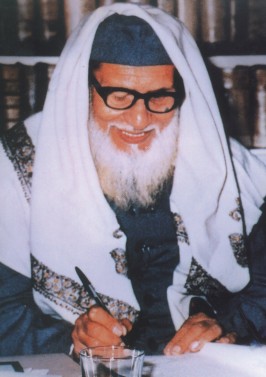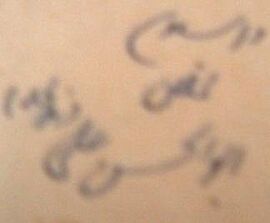Abul Hasan Ali Hasani Nadwi facts for kids
Quick facts for kids
Abul Hasan Ali Hasani Nadwi
|
|
|---|---|
 |
|
| 7th Chancellor of Darul Uloom Nadwatul Ulama | |
| In office 1961 – 31 December 1999 |
|
| Preceded by | Abdul Ali Hasani |
| Succeeded by | Rabey Hasani Nadwi |
| Personal details | |
| Born | 5 December 1913 Raebareli, United Provinces of Agra and Oudh, British India |
| Died | 31 December 1999 (aged 86) Raebareli, Uttar Pradesh, India |
| Alma mater |
|
| Denomination | Sunni |
| Founder of | Academy of Islamic Research & Publications |
| Parents |
|
| Religious career | |
| Disciple(s) | Abu Saeed Muhammad Omar Ali, Abdullah Hasani Nadwi, |
| Literary works |
|
| Influenced | Yusuf al-Qaradawi, Rabey Hasani Nadwi, Mohammad Akram Nadwi, Sultan Zauq Nadvi, Wazeh Rashid Hasani Nadwi, Shafiqur Rahman Nadwi, Kaleem Siddiqui, Abu Taher Misbah, Bilal Abdul Hai Hasani Nadwi |
| Signature |  |
Syed Abul Hasan Ali Hasani Nadwi (born December 5, 1913 – died December 31, 1999) was a very important Islamic scholar and writer from India. People often called him Ali Miyan. He wrote many books about history, important people, and the Muslim community in India.
He was a leading figure in the Deoband School of thought. His ideas helped shape how Muslims in India lived and thought, both in their country and around the world. Because he was so good at speaking and writing Arabic, his influence spread far beyond India, especially in Arab countries.
Ali Nadwi started teaching at Nadwatul Ulama in 1934. Later, in 1961, he became its Chancellor. In 1985, he was chosen to be the Chairman of the Oxford Centre for Islamic Studies. He also had a strong connection with Tablighi Jamaat throughout his life.
His book Islam and the World was very famous, especially in the Arab world. It was first published in 1951. His books are even studied in many Arab Universities. In 1951, during his second Hajj (pilgrimage to Mecca), he was given a special honor. The person holding the key to the Kaaba (a holy building in Mecca) opened its doors for him for two days. This allowed him to bring anyone he wanted inside. He was the first Alim (scholar) from India to receive this honor from the Royal Family of Saudi Arabia.
He was also the head of the Executive Committee of Darul Uloom Deoband and the president of the All India Muslim Personal Law Board. He started the Payam-e-Insaniyaat Movement and helped create the All India Muslim Majlis-e-Mushawarat and the Academy of Islamic Research & Publication. He was a founding member of the Muslim World League and served on important councils for Islamic universities.
His talks at universities in India, Arab countries, and the West were seen as new and important ideas about Islam and its place in the modern world. He believed that Islamic civilization could be made strong again by combining Islamic ideas with some Western concepts. He received several major awards, including the King Faisal International Prize in 1980, the Sultan of Brunei International Prize, and the UAE Award in 1999.
Contents
Early Life
Abul Hasan Ali Nadwi was born in Rae-Bareilly, North India, on December 5, 1913. His full name was Ali bin Abdul Hay bin Fahruddeen Al-Hasani. His family line goes back to Hasan Al Musanna, who was the grandson of Ali bin Abi Talib.
He came from a family of highly educated scholars. His father, Abdul Hayy Hasani, wrote famous books like Nuzhatul Khawatir, which was a dictionary of Indian scholars. Ali Nadwi was also a descendant of Syed Ahmad Barelvi, a leader who fought against British rule in India.
Even though his family had lived in India for a long time, Ali Nadwi was very good at spoken and written Arabic. He was widely known in India as Ali Miyan. The name "Nadwi" was not his family name. It was given to scholars who studied at the Nadwat-ul-ulama in Lucknow, India.
Ali Nadwi grew up in a very religious home. His father, Hakim Syed Abdul Hayy Nadwi al-Hasani, was the Rector of Nadwat-ul-ulama. When Ali Nadwi was nine years old, his father passed away in 1923. After that, he was raised by his mother and his older brother, Hakim Abdul Ali Nadwi.
His mother was a very educated woman for her time. She had memorized the Qur’ān and was also a poet and writer. She wrote books for women and girls, like Husnul Maashirah (Social Manners). His older brother, Sayyid Abd al-Ali al Hasani, was a medical doctor who also had deep knowledge of Islam. He made sure Ali Nadwi was raised with strong Islamic values. This upbringing helped Ali Nadwi develop a deep commitment to Islam.
Education and Teachings
Ali Nadwi earned a B.A in Arabic literature from the University of Lucknow in 1927. To become a religious scholar, he went to Nadwatul Ulama for higher studies. This institution, also known as Nadwa, was founded in 1894 to combine traditional Islamic learning with modern ideas. It aimed to create new Islamic scholars who understood both classical Islam and the challenges of the modern world.
At Nadwa, young Ali Nadwi learned about new ideas in Islamic thought from other Muslim countries. He also learned modern spoken and written Arabic from two important Arab teachers: Khalil Muhammad of Yemen and Muhammad Taqi-ud-Din al-Hilali of Morocco. He studied Hadith (sayings of Prophet Muhammad) under Hussain Ahmed Madani at Darul Uloom Deoband. He also studied Tafsir (Qur'anic commentary) under Ahmed Ali Lahori, where he was influenced by the poetry of Muhammad Iqbal.
A big change in Ali Nadwi's life happened in 1934. After finishing his studies, he was asked to teach Arabic and Qur’anic commentary at Nadwat al-ulama. He played a key role in making Nadwa a well-known research center worldwide. As the head of the institution, he worked to update the education system to meet the needs of the modern age.
Important Ideas
Ali Nadwi had strong views on how Islam and the modern world should interact. He believed that Western technology and progress were powerful, but he also felt that Western culture had lost its spiritual values. He thought that Muslims should hold onto their Islamic identity and values, which he believed were universal and complete.
He explained that Islam teaches people to respect each other, even if they are different. He felt that Western society, despite its progress, sometimes lacked this unity and respect. He believed that true progress, like that seen in early Islamic history, brings good to all people, not just one group.
Ali Nadwi suggested several ways to strengthen Islamic identity in modern times:
- Formal Approach: Muslims should always follow the teachings of the Quran and Hadith. These texts provide guidance for all parts of life, from social manners to economics and science.
- Historical Approach: He wrote the book Saviours of Islamic Spirit to show how Islam once led the world in progress. He believed that learning about great Muslim figures from history could inspire Muslims today. He argued that if Muslims faced challenges, it was often because they had strayed from the right path.
- Social Approach: He criticized some aspects of Western society, like what he saw as a lack of strong community ties and a focus on material things. He believed that Islamic values, like hospitality and helping others, were very important. He himself would often give help to both Muslims and non-Muslims, showing how Islam encourages kindness to everyone.
- Economic Approach: He believed that Western education often focused too much on getting high positions and money, without enough spiritual guidance. He felt this could lead to a decline in morals.
Ali Nadwi believed that Muslims should not try to avoid Western influence completely. Instead, he thought they should study Western ideas and then develop their own strong Islamic ideas in response. He encouraged Muslims to work together peacefully and to show the good values of Islam through their actions. He also stressed the important role of women in upholding Islamic teachings in society.
Writings
Abul Hasan Ali Nadwi mostly wrote in Arabic, but he also wrote in Urdu. He wrote more than fifty books on history, theology, and biographies. He also wrote thousands of articles and gave many speeches.
His 1950 book Maza Khasiral Alam be Inhitat al-Muslimeen, which was translated into English as Islam and the World, helped make the idea of "modern Jahiliyya" popular. This term describes a state of moral decline and materialism, not just a time in history.
He wrote Qasas al-Nabiyyeen (translated as 'Stories of the Prophets') for his nephew. This book became very popular for people learning Arabic and is now used in many schools around the world. He also introduced the famous poet Dr. Muhammad Iqbal and his Islamic ideas to the Arab world through his book Rawa'i' Iqbal.
He wrote a detailed biography of his father called Hayat-e-Abdul Haiy. He also wrote about his mother in Zikr-e-Khayr. His own life story, Karawan-e-Zindagi, was written in seven volumes.
Ali Nadwi believed in pan-Islamism, which means Muslims around the world should be united. He was against Arab nationalism and pan-Arabism because he felt they divided Muslims. He also had a lifelong connection with the Tablighi Jamaat.
Positions, Honours and Awards
Ali Nadwi held many important positions and received several awards:
- 1962: He was a founding member and secretary of the first meeting of the Muslim World League in Mecca.
- 1980: He received the King Faisal Award, a very prestigious international award.
- He was the Founding Chairman of the Oxford Centre for Islamic Studies.
- 1984: He became the President of the 'League of Islamic Literature'.
- 1999: He received the 'Islamic Personality of Year' award from Sheikh Mohammed of the United Arab Emirates.
- 1999: He also received the Sultan of Brunei Award.
After he passed away, the International Islamic University, Islamabad (IIUI) in Pakistan held a seminar in his honor. They published the speeches and articles from this event in a book.
Access to the Kaaba
In 1951, during his second pilgrimage (Hajj) to Mecca, Ali Nadwi was given a very special honor. The person who holds the key to the Kaaba (Islam's holiest building) opened its door for two days. This allowed Abul Hasan Ali Nadwi to bring anyone he chose inside.
He was given the key to the Kaaba so he could enter whenever he wanted during his pilgrimage.
Death
Abul Hasan Ali Hasani Nadwi passed away on December 31, 1999, in Raebareli, India. He was 85 years old.
Legacy
Ali Nadwi left behind a lasting legacy through his work and institutions.
- Center for Research, Dawah and Islamic Thoughts: This center, called "Abul Hasan Ali Nadwi center for Research, Dawah and Islamic thoughts," continues his work. It provides free Islamic books and other materials.
- Educational and Welfare Foundation, Aligarh: Established in 2003, this foundation aims to improve the lives of Muslim minorities in various areas, including education, economy, and culture.
- Shaykh Abul Hasan Ali Nadwi Islamic Research Center, Dhaka, Bangladesh: This center in Bangladesh is a unique institution for higher Islamic education and research.
See also
- Bibliography of Abul Hasan Ali Hasani Nadwi
- List of Deobandis
Images for kids


